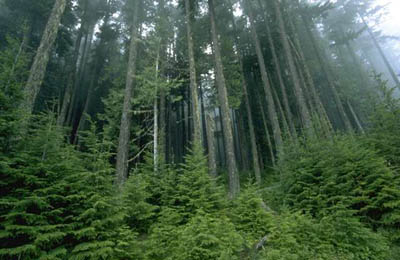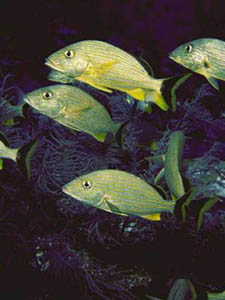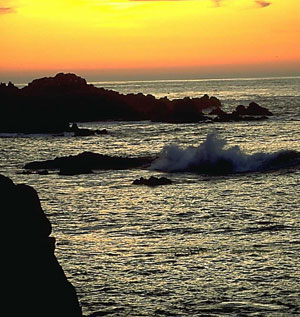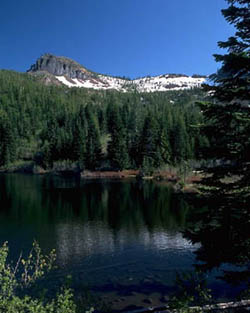 |
![]()

Reverence for the planet is yet another important component to the vegetarian lifestyle. And while I realize that many of us aren't exactly banner-waving environmental activists, we all have to live here, and it is, therefore, important that we take into account how our actions may be wasting or harming our earthly resources.
One lesser-known way in which our environment is deeply affected is by our choices of food, clothing and other consumer goods. Both the factory farming procedures and modern "mega-volume" fishing methods involved in producing animal products, are creating some staggering environmental repercussions. Let's take a closer look...
Here's
what we'll be covering in this For the Planet
section (Click on the Go link to
skip ahead to that particular topic.):
1.
What's the real cost of animal products? Go
2. Some frightening numbers.... Go
3. Understanding
the vicious cycle of planetary destruction
Go
4. How
is ocean life affected? Go
5. Messing with perfection Go
What's
the real cost of animal products?
To grasp the magnitude of this environmental situation, you have to
understand the enormity of the factory farm world. Let's take the beef
and dairy industries as an example. There are, conservatively, two cows
per human being in this country. (That's right: we are all outnumbered
two-to-one by cattle.) These animals are fattened up with tremendous
amounts of grain. Where does the grain come from? Usually, from land
that has been cleared of its trees for the sole purpose of growing this
grain. So, right off the bat, we're losing thousands of acres of beautiful
forests which, if you've ever heard of the greenhouse effect on our
ozone layer, you know that trees are our biggest allies.

How
is the grain grown? It's grown with water that, in most cases, has to
be irrigated into these fields. The amount of water expended for this
is mind-boggling, as I'll illustrate in a moment. How else is the grain
grown? It's grown with poisonous, fat-soluble herbicides and pesticides
that are ingested first by the animals, then by the consumer. Also,
as a natural result of eating these massive amounts of grain, the cows
leave us with tons of highly-toxic excrement. These mountains of manure
(quite literally) are not only a detriment to our drinking water, as
the rain washes the nitrates and poisons from the manure into the ground
where they infiltrate our water supplies, but they also release tremendous
amounts of toxic emissions into the air, much like the exhaust from
automobiles. (Gives new meaning to the word "bullshit," doesn't
it?) Even chickens and pigs contribute their fair share to this waste
problem. An egg factory with 60,000 hens will generate over 80 tons
of excrement every week, while a single pig is good for around 4 pounds
of excrement and 5 pounds of urine...every day. All told, the factory
farm industry delivers to our world 86,600 pounds of excrement per second!
This is 130 times more than all the humans on earth, combined.
Now,
ecologically speaking, how do these figures translate into, let's say,
a quarter-pound hamburger? In his groundbreaking work, Diet For a
New America, John Robbins provides us with some hard numbers that
illustrate exactly how wasteful and outrageous this situation really
is. Through meticulous research, he was able to calculate how much of
our resources are utilized and/or affected by a feedlot steer in terms
of what that steer yields in actual beef. Let's take a peek at a few
figures:
One quarter-pound of beef:
A) Utilizes 66 square feet of land (versus, for example, the same amount
of land yielding 5,000 pounds of potatoes).
B) Represents the total amount of water the average person uses around
the house (i.e. shower, sink, toilet, kitchen use, etc.) for an entire
month, or the total amount of fossil fuel you would use to drive a small
car 20 miles down the road.
C) Causes the emission of the same amount of toxins as about 7 1/2 weeks
of automobile exhaust.
D) Requires four pounds of grain, which could represent a day's worth
of food for four starving people.
On a larger scale, take a look at a few more stats that further illustrate the devastating effects of animal agriculture on our world:
Understanding
the Vicious Cycle of Planetary Destruction
These are just the tangible numbers. But how do we put a price on the
260 million acres of forest that have been converted into crop land
in the U.S.? Or the 6 billion tons of topsoil that is lost from American
farms every year as a direct result of the deforestation? How do we
put a price on the outlandish use of energy in animal agriculture when
we consider: a) the fossil fuel for all the tractors and trucks used
to grow and transport the grain and hay, b) the factory farm buildings
that must be warmed in the winter and cooled in the summer, c) the transportation
and refrigeration of the meat and, d) the thousands of meat lockers
and freezers required for storage?
And what about the consequences of burning all of these fuels? What about the carbon monoxide that's released into the air, which then keeps the heat in and contributes to the global warming phenomenon? Or how about all the irrigation pumps? In the Pacific Northwest, so much water has been taken from the rivers for irrigation that the rivers actually provide less power for the electrical turbines. As a result, the hydra-electric capability of these turbines is lessened, which causes a demand for nuclear plants in order to compensate for this energy deficit. I'm telling you, this cycle is so far-reaching and destructive on so many levels.
| Tragically, the pillaging of our resources isn't restricted to our land; it's devastating our oceans, as well. Again, as an industry responds to an insatiable supply and demand scenario, we have an inconceivable number of sea creatures that are being eaten every year. And, we're not just talking about a bunch of fishermen "reeling 'em in" one at a time from the side of a fishing boat. We're talking about over 35,000 fully-staffed, state-of-the-art fishing vessels that scour our oceans with cutting edge sonar technologies and fishing nets so massive they could literally engulf 12 jumbo jets in one swoop. And in the process of raping the waters of up to 90% of a given species of fish per year, their indiscriminate methodologies for procuring large quantities of consumer favorites is wreaking havoc on other ocean life. |
 |
This "blanketing the waters" approach winds up killing many
other sea creatures like smaller fish, turtles, dolphins and even sea
birds. It's also bringing certain species to the brink of extinction.
This, in turn, upsets the delicate eco-balance of ocean life and creates
a domino effect throughout the seas.

Additionally, the agricultural pollutants resulting from the above-mentioned factory farming systems are poisoning our oceans, as well as other bodies of water. Here we see another ominous cycle unfold.
1. Soil erodes, due to the unnatural demands placed on it throughout the factory farming process.
2.
The manure, fertilizer and various chemical residues are washed into
our waters, which include everything from rivers to oceans to lakes,
eventually even filtering down into our underground water supplies.
3. These same toxic sediments that wind up in our waters have an indisputably
destructive effect on aquatic organisms, including millions of fish.
4. As farmers attempt to replenish their depleted soil with more chemicals, the weakened topsoil gives way to further runoff, and the water pollution continues.
5. Soil productivity takes a nose-dive, which precipitates even more chemical fertilizer treatments, and the cycle continues.

There is an inherent perfection in how things work here on earth. Ecosystems, food chains, optimum oxygen/carbon monoxide ratios and so forth, are all divinely balanced to insure that all living things - we humans, our fellow creatures and the seemingly infinite varieties of trees and vegetation - may participate in an abundant and healthy existence.
However, when our food choices are products of any of these harmful processes, we are contributing to a profound imbalance in our planetary ecology. And while it may seem inconsequential at first glance...let's not fool ourselves. We are making a mess of the earth and, to the extent that we continue to perpetuate the consumption of animal products, this dire condition will continue to spiral downward. And this is an especially poignant injustice for the generations to follow, isn't it?
At the same time, the opportunity exists for an ecological atonement, where the earth will heal and every aspect of this divine balance will be restored. Our magnificent planet is capable of healing herself. All she needs is for us to stop conspiring against her! So, as we choose plant-based foods, we are making a profound and significant contribution to this healing process.

"Nothing
will benefit human health
and increase chances for survival of
life on earth as much as the evolution
to a vegetarian diet."
Albert Einstein
Proceed
to What To Do
Home - - About Bobby Rock - - Commonly Asked Questions - -
Animal Acres Page - -E-mail Bobby - - Rights vs. Welfare Essay
© 2002 - 2008 Bobby Rock









